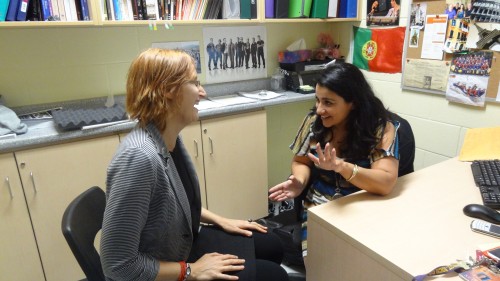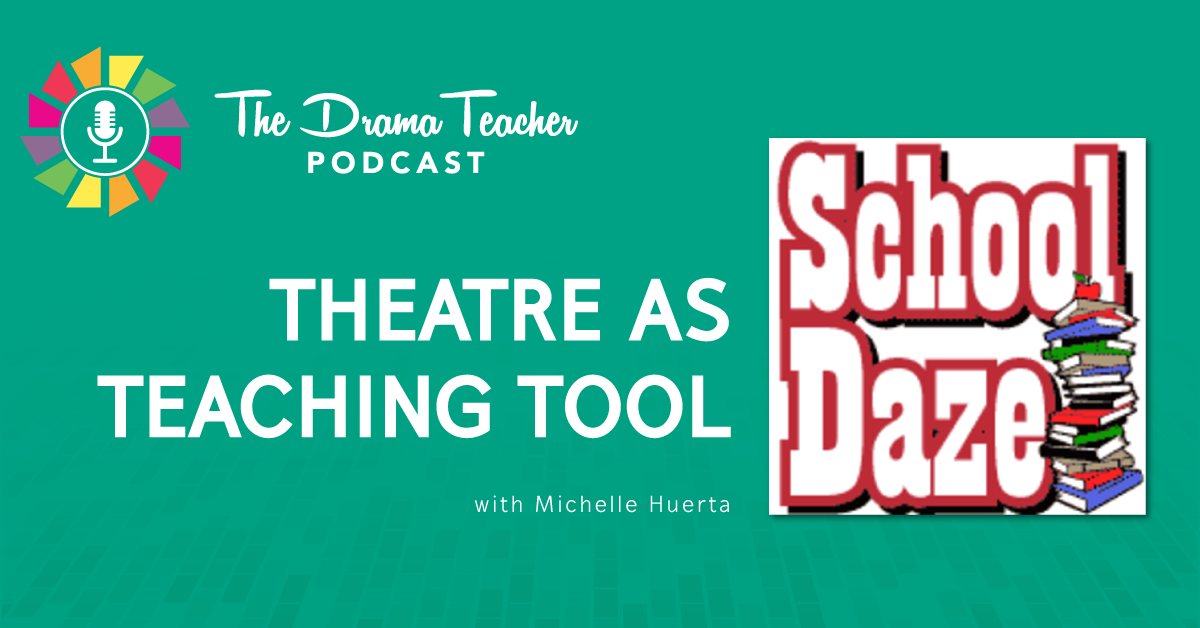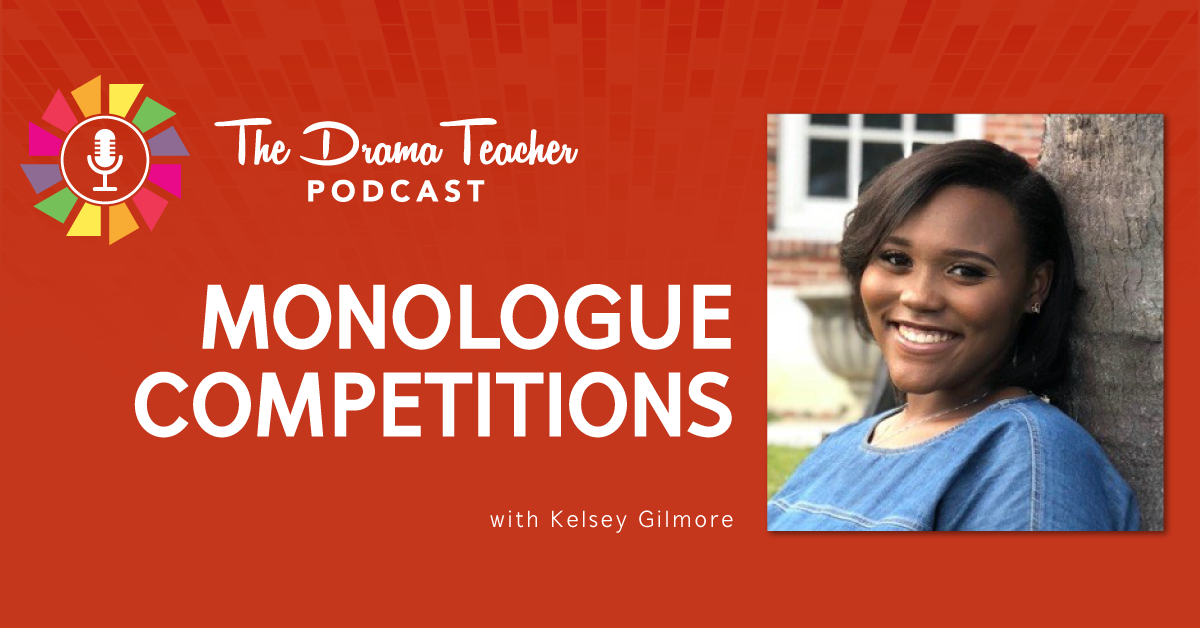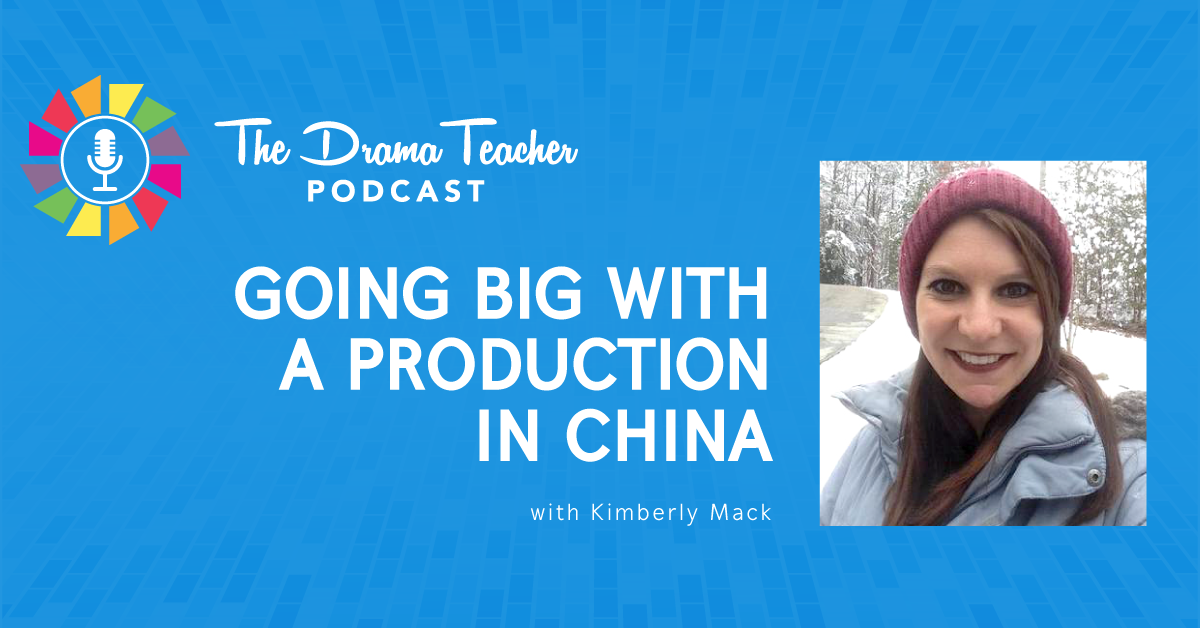What would you do if you stumbled on a huge picnic with a sign that said FREE FOOD? Free: Competition Version is a thought-provoking ensemble piece that dives into belief, greed, and tough choices — and it’s a great pick for competitions and tech fun too.
Stepping out of Your Comfort Zone
Episode 17: Stepping out of Your Comfort Zone
This week Lindsay talks with teacher Cindy Cabral about stepping outside her directing comfort zone when she took on Lindsay’s new Edgar Allan Poe adaptation The Tell Tale Heart and Other Strangeness.
Subscribe to The Theatrefolk Podcast
Episode Transcript
Welcome to TFP, The Theatrefolk Podcast. I am Lindsay Price, resident playwright for Theatrefolk. Hello! I hope you’re well. Thanks for listening.
Today, we’re talking about stepping outside your comfort zone, your theatre comfort zone, with teacher Cindy Cabral. But first, let’s do some THEATREFOLK NEWS.
This week, Theatrefolk is going to be at the Arizona State Thespian festival. Not only will we have a table with free goodies such as our Play Tastings CD-ROM which has sample pages from every play we have – that’s right, every single play – I’ll be teaching my All My Ideas Suck workshop which teaches students that, in fact, their ideas do not suck and how to find a step-by-step process to get from topic to sustainable play idea which means how do I come up with an idea that will actually turn into a play. AND, AND I’ll also be participating in the Arizona Playworks program. This is an awesome program for student playwrights. Students submit short plays and four are selected. Then, over the course of the weekend, we get together with the playwrights, talk about the plays, they do re-writes and then we audition actors to be in the plays and then we rehearse and put them up as a staged reading all in two days. It’s intense. It’s a great experience for the students and it’s a great experience for me! I always learn something on how to communicate constructive feedback.
Lastly, where, oh, where can you find this podcast? We post new episodes every Wednesday at theatrefolk.com and our Facebook page and on Twitter. You can find us on the Stitcher app and you can subscribe to TFP on iTunes. All you have to do is search on the word “Theatrefolk.”
Episode Seventeen: Step Outside The Zone
Okay, that was a bit dramatic but it’s true! We all have a comfort zone as artists. It’s a place where we know we do good work because it’s an area we’re familiar with. For example, for me, writing sarcastic teenage girl dialogue – very familiar for me. So, you know, it’s a type of play that comes easy, it’s a dance we’ve done a million times, an acting role that’s similar to our personality. It’s a nice snuggly blanket of an area and teacher Cindy Cabral went outside that fuzzy blanket zone. She directed the premiere production of my new play The Tell Tale Heart and Other Strangeness – an adaptation of Edgar Allan Poe stories. It’s been a difficult process for me, not just getting the stories from the page to the stage, but even just getting a school to perform the play and I was really excited last month to finally see the play on its feet so we talk about that and we talk about what it’s like to do a play you’ve never done before. It’s a genre you’ve never done before and your students have never been exposed to before and what it’s like to jump off that cliff.
You’ll hear some noise in the background of the interview. It was a couple of hours before the performance and students were not wasting any time. They were still running scenes on their own, they were trying to get in that one last rehearsal and I love that so I didn’t tell them to be quiet. I think it’s really great. Let’s get to the interview.
Lindsay: Hello, Cindy Cabral.
Cindy: Hello.
Lindsay: Is it Cabral?
Cindy: Cabral.
Lindsay: Okay. So, I’m sitting here with Cindy Cabral of Saint Roch.
Cindy: Rock.
Lindsay: Saint Rock? Really? Okay.
Cindy: Yeah, it’s Saint Rocho. I don’t know why they didn’t just keep it Saint Rocho.
Lindsay: Cool. Secondary school in Brampton, Ontario. And we are here, it’s a very exciting night because it is the premier of my adaptation of Edgar Allan Poe, The Tell Tale Heart and Other Strangeness. And how are you feeling?
Cindy: I’m excited.
Lindsay: Yes.
Cindy: And nervous.
Lindsay: Yes.
Cindy: We had a very challenging dress rehearsal yesterday.
Lindsay: I know. That’s all right.
Cindy: But they always say a bad dress rehearsal means a great production.
Lindsay: That’s right.
Cindy: So, I’m kind of going with that theory. I’m nervous because I’ve never done anything like this before as I’ve told you – nothing this abstract and nothing this creepy.
Lindsay: And that’s really the reason I wanted to kind of sit down and have this talk with you today because you have expressed that this is way out of your comfort zone.
Cindy: Hmm. Totally.
Lindsay: It is a, you know, Poe is a very, he’s a strange bird from the get-go and what I really wanted to do was, well, I wanted to take this very literary story and make it theatrical. So, to do that, there has to be some visualization, some abstraction, to make it not just, you know, I’m taking a book and I’m putting it on stage. We have to be more out-of-the-box than that.
Cindy: Yes.
Lindsay: And because of that, I think that I’ve had a lot of trouble finding a school to do the premier production to the point where I really thought that there was something very much wrong with the scripts, there was something wrong that I was doing with it because I’ve never stonewalled by teachers before – not even just not wanting to take this project on. So, I came and we did a workshop in May. We did three days which was amazing because, for me, I went, “No, I’m okay. This is fine. I’m good. The script is good.”
Cindy: “My idea worked.”
Lindsay: “My idea was all right.” And also, that you went, “I want to try this. I want to do this.”
What made you decide to go to do the production?
Cindy: First, I thought it was a huge honor that you had asked me so I was like, “Let me really consider this instead of saying no, shying away from it.” And also, we’re always telling these students, these young actors, to get out of their comfort zone, to play different kinds of characters. Don’t go to your safe place. Really push yourself. Take risks. And I should be doing that as well so I really believe in living by what you are teaching.
Lindsay: What you’re trying to get them to do.
Cindy: Exactly. So, I knew that I would have challenges and I would have moments where I was like, “What was I thinking in saying yes?” but then it always happens to work out and this really was like a co-creation ensemble because it was like, “Guys, I’m stuck. What are your ideas?” and they’d be like, “Blah blah blah, blah blah blah,” and I’d be like, “Yes! Amazing!’ and then I’d roll with that and then make it something bigger.
Lindsay: So, basically, this…
Cindy: It was more fear that was going to stop me, right. Fearing that unknown.
Lindsay: Right.
Cindy: But then it was like, “No. Try it. She is there to help you and the students are here to help you,” and it all worked out.
Lindsay: And what I was saying, I just had a talk with the kids and it’s very true, there’s really nothing that you can do that is wrong because nobody’s done it so it’s like there may be things that I go, “Oh! Okay, it was interpreted that way. All right, that’s not exactly what I intended then it’s my job to change it.”
Cindy: And we don’t want to disappoint you, right?
Lindsay: Yeah, but I am such a proponent of the process that students go through now. I’ve really come over the numbers of years that I’ve been doing this, how I’ve come to believe very strongly in the process.
Cindy: Oh, completely.
Lindsay: I’ve come to believe very strongly that, if you can, you know, put something in front of them and they can work together as an ensemble, if they can truly form a community, if they can help each other, if they can learn something and do something they’ve never done before, the end product is less important.
Cindy: Oh, I completely agree. And when you have a good end-product, that most…
Lindsay: That’s icing.
Cindy: Yeah!
Lindsay: But the cake has been this wonderful experience. This skill-building, this thing that they will remember for the rest of their lives, and they’re going to remember the times they shared, more so than the performance. So, I’m never going to be disappointed. I know what goes into rehearsals and I know what goes into the experience of a high school student preparing to perform. And I’m really proud to be part of that process so I’m so thrilled that this is taking place and that it is very clear that they seem excited. They don’t seem afraid. But they’re never afraid, are they? You know?
Cindy: Really afraid five minutes before and then it’s all excited all over again.
Lindsay: That’s what I’m really, really so pleased that you just dove in because sometimes it’s our adult fears that hold us back.
Cindy: And that’s what it is, yeah.
Lindsay: So, tell me your most fearful moment in this rehearsal process?
Cindy: When the first time we put on pit and the first time we put on the raven and I said, “This is a disaster.” Like, I’m missing something. Like, it’s just not working. And then the students, I’d be like, “Is this working?” They’re like, “Yeah,” but they weren’t convinced either. So, when I couldn’t figure out those two scenes, it was almost like, maybe I have been wrong about all these other scenes.
Lindsay: Right. It’s just started to unravel.
Cindy: Yes, and then I kind of went into a little panic mode and that is when I contacted you, “Please, help me.” But then, one of the students was like, “In pit, how about we just keep it simple? We do a little bit more (0:10:24.3 unclear)” and it worked. So, I don’t know for that but for the raven, that is when you gave me those stage directions and it really adds to the creepiness and the oneness of that these five people are this one person watching this raven.
Lindsay: And that is a really important thing that I’m so glad that you contacted me because that was something that I had put in and that I had taken out and it’s like, “Wow. Let’s try it. Let’s throw it back in and see what happens.” And that is really the whole point of putting, of developing – it’s developing a play, like this is not finished yet, you know. I’m going to watch it. I’m going to take notes. I’m very lucky in that I have another school who’s going to produce it in March so I’ve got a really good development chunk which it cannot do until someone takes that risk and takes that jump.
So, what’ve you learned? What do you think you’ve learned by doing this?
Cindy: One thing that I learned was, because I’m not the high school age, I forgot that most students do not understand what the poem is actually saying.
Lindsay: Right.
Cindy: So, when we first started, I’d be like, “Guys, do you not understand?” and they’re like, “No, we’re lost.” And I was like, “Ah! Okay, your mind hasn’t developed to that point yet.” So I find that it’s even taught me on how to try to remember what you were like in high school and what they are like and how their way of thinking is. I also learned that something very simple can be so creepy, or it can be so funny, or can be so, “Huh,” you know? Like, a “huh” moment. You don’t need a whole lot sometimes and I think that they saw all that, too. Like, “What do you mean I’m doing too much?”
Lindsay: Well, everything on Broadway is too much now, right? So, when they go to see something, they have wicked in their heads.
Cindy: They have that idea.
Lindsay: And so, it’s all about trying to fight that and just sort of like, “You know what? We need to go like this and hone it down as opposed to blowing it up.” I think that’s why Poe works best that way because I think all of his works are a one-on-one experience, right? It’s the person who is reading the words on the page. Actually, this is a really good point. I have to think about this to actually add it into the script. But it’s one person who’s reading it onto the page and the page coming back into the mind of the audience. It’s a one-on-one experience so how do we make that in theatre but actually making it alive?
Sorry, I’m literally just going, “You know what? I have to remember that.” Okay.
Cindy: Replay this.
Lindsay: I have it on tape! Okay, and what was the moment when you went, “Okay, everything’s going to be fine?”
Cindy: After we started working through the pit and the pendulum because then it was like, “You know what? We are on the right track,” and then, every rehearsal after that, I felt like even my mind opened up with, “Let’s try this. Let’s try this. Let’s do this. No, cut that. Let’s rearrange this.” Because then it was like all those fears went away. I wasn’t stopping myself so I’d say, like a couple of weeks ago – two and a half, three weeks ago – once we’ve worked out that scene and then…
Lindsay: Then there were no…
Cindy: Yes.
Lindsay: You could just keep going.
Cindy: Yeah, and once I got the raven’s script, it was like, “Yes, this is right. This is perfect.”
Lindsay: Do you think it is – because I find your students incredibly quick-thinking and very receptive – do you think that it helped? Because it seems they’re very collaborative.
Cindy: Oh, for sure.
Lindsay: Do you think that that’s what this kind of script required that? Do you think you could have done it if you were being more of an over-seer director as opposed to a collaborative director?
Cindy: I, personally, for me, that wouldn’t work. I relied on the collaboration, but maybe that’s because I’ve never done anything like this before. I’m not sure but I felt like the collaboration worked completely whereas I worked on a few shows were it was too much collaboration, I’m like, “Guys, this isn’t working. We have to leave it to me.” But this, I don’t know how I would have done it without them.
Lindsay: Which is kind of neat, I think that’s lovely.
Cindy: True ensemble process.
Lindsay: I think that’s wonderful, and I think it’s wonderful because I don’t know how often they get a true ensemble collaborative experience at the high school age. I think there’s a lot more – I’ve certainly done it, you know, when I go into workshops, it’s very much, “Okay, you do this, you do this, you do this,” because I ‘m looking for something, you know, very, very specific. And I think too, in the larger the piece, there is not the room for collaboration, so how wonderful to sort of have that opportunity and be able to do that. I can’t wait. I cannot wait. I’m very, very excited to see.
Cindy: I hope you like it, I really do.
Lindsay: But just seeing it up. I just can’t express how wonderful it is that it’s happening and not sitting in my drawer at home doing nothing because now I can take the next step. Because now, it can become a play and it can move forward. And I truly believe it’s a great, I think it has a lot of theatrical potential and you guys willing to be part of that.
Cindy: Thank you so much.
Lindsay: Thank you so much, Cindy.
Thank you so much to Cindy and the students of St. Roch Secondary School. And that’s where we’re going to end. That’s it. That’s all. Take care, my friends. Take care.
Music credit: “Ave” by Alex (feat. Morusque) is licensed under a Creative Commons license.



